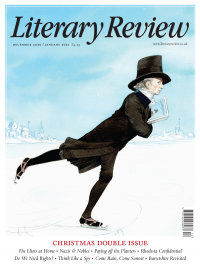Richard Vinen
The Devil’s Crop
The Blood of the Colony: Wine and the Rise and Fall of French Algeria
By Owen White
Harvard University Press 336pp £31.95
I should guess that most educated English people (and perhaps, for that matter, most educated French people) draw their information about the history of Algeria from two sources. Many will have seen Gillo Pontecorvo’s 1966 film The Battle of Algiers, which depicts the savage conflict between French paratroopers and the Algerian Front de Libération Nationale (FLN). Many will also have read the novels of Albert Camus. All this means that our image of Algerian history tends to focus on the endgame of French rule in Algeria – the period from 1945 to 1962. The vision of Algeria offered by both Pontecorvo and Camus is also an almost entirely urban one. The greater part of the European population of Algeria lived in a small number of cities: Algiers, Oran, Constantine and Bône. If wine plays any role in the usual portrayal of Algeria, it is as something that separates the Europeans from the native Algerians, who were mainly Muslims. The FLN sought to suppress the drinking of alcohol and one of the most chilling scenes in The Battle of Algiers depicts nationalist activists inciting children to lynch a drunk.
Owen White offers a different perspective. He points out that in 1932 the area around Oran made more wine than the Gironde region in France. By the time of its independence, Algeria was the fourth largest producer of wine in the world after France, Spain and Italy. Looking at wine

Sign Up to our newsletter
Receive free articles, highlights from the archive, news, details of prizes, and much more.@Lit_Review
Follow Literary Review on Twitter
Twitter Feed
The era of dollar dominance might be coming to an end. But if not the dollar, which currency will be the backbone of the global economic system?
@HowardJDavies weighs up the alternatives.
Howard Davies - Greenbacks Down, First Editions Up
Howard Davies: Greenbacks Down, First Editions Up - Our Dollar, Your Problem: An Insider’s View of Seven Turbulent...
literaryreview.co.uk
Johannes Gutenberg cut corners at every turn when putting together his bible. How, then, did his creation achieve such renown?
@JosephHone_ investigates.
Joseph Hone - Start the Presses!
Joseph Hone: Start the Presses! - Johannes Gutenberg: A Biography in Books by Eric Marshall White
literaryreview.co.uk
Convinced of her own brilliance, Gertrude Stein wished to be ‘as popular as Gilbert and Sullivan’ and laboured tirelessly to ensure that her celebrity would outlive her.
@sophieolive examines the real Stein.
Sophie Oliver - The Once & Future Genius
Sophie Oliver: The Once & Future Genius - Gertrude Stein: An Afterlife by Francesca Wade
literaryreview.co.uk